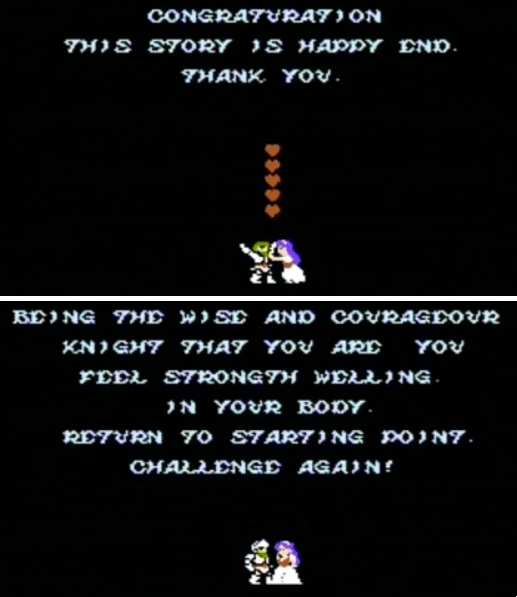(Published on June 6th 2016, this article asks; Is making games easier a good thing?)
Something I remember from when I was young, that pertains to video games, was a conversation I had with one of my grandma’s friends. I couldn’t have been more than 10 years old at the time and was completely enthralled in my Gameboy when she asked me a question, “Don’t you just love how hard video games are and what they teach you?”
I responded like the 10-year-old smart-ass that I was and told her, “Yeah, they teach you how to use cheat codes.” She chuckled at me and then went on to explain how video games teach people persistence and problem-solving skills all while giving a sense of accomplishment. At the time I really didn’t really give it much thought, but as of late I keep going back to what she told me. She was right.
I was fortunate enough to start what would be a lifetime of gaming in the mid 1980’s. For those of you who weren’t aware, this was a point in which video gaming was changing. Generally speaking, most video games released before 1985 were what I call “point games”. Games like Centipede, Pac-man and Donkey Kong all focused on how many points the player could accumulate. About the time I started gaming the technology used in video games had advanced enough that developers could make games longer and incorporate a story into them.
I don’t mean to take anything away from “point games”. Actually, the older I get and the more my free time comes at a premium, the more appreciation I have for them. Although those games are difficult in their own way, when I think of hard games I think of story driven games.
So what made them hard? Well for starters most didn’t have a battery back-up or password system. And even if they did, what little kid wants to write down a 24-character password, with both upper and lower-case letters and also numbers including “0”? (I’m looking at you, Metroid.) In most cases, you found yourself playing the game from the beginning every time and to make things worse, most games gave you a limited amount of lives and/or continues.
There was also very little support for the games back then. Yes, it’s true we had the game manuals. That lasted about 3 days before they were lost. And we had the Nintendo help line, which charged you every time you called and was usually followed up by your parents yelling at you for racking up the phone bill. In most cases we had to figure them out ourselves.
But sometimes, even against the odds written above, the stars would align and you would actually finish a game. And it was one of the greatest feelings in the world! Hours of repetitive play, thrown controllers, sweaty hands and blood shot eyes didn’t matter because you finished the game. Whether it was the fact you could now brag about it or just knowing you got to see the ending, on the days you beat a game you would walk a little taller and had a sense of accomplishment about you.
Sadly, it’s harder to find that feeling today. There are many technological advances that have stripped the difficulty away from video games. Just about every game has the ability to be saved and resumed at a later point, and most have unlimited continues. Any given game can also be Googled or YouTubed showing you exactly what to do and exactly how to do it. That one drives me crazy.
Lately though, Nintendo has been taking it to a different level, and I’m not typing about warp zones here. An example I’ve recently experienced is from Super Mario 3D Land. On any level, if the player dies five times in a row he or she is asked if they want to wear the Golden Tanooki Suit. The suit grants the player invincibility for the entire level. No joke.
I get why Nintendo is doing this. Looking back at my childhood there was nothing worse than begging your parents for a $50 game, only to bring it home and find out that it was so hard you couldn’t get past the first level. I think Nintendo realized that this happened and wanted to make sure players of all ages and skill levels found value in their games. But this doesn’t always have a positive effect on players.
Now at this point I’m sure some of you are probably thinking to yourself, “Well Rob, you just grew up, are now better at games and you have played so many that beating them doesn’t even phase you anymore.” To which I would say, “Not true”, and here’s why. Last year, to celebrate my birthday, Chris and I sat down and played Mega Man 2. Up until that point neither one of us had had any exposure to the game. (I know, right?) We made sure that when we played it, if we got stuck on something, we would never reach for our phones. After about 4 hours we finally beat Dr. Wily and finished the game. Our hands were sweaty, eyes bloodshot, we had cursed more than any two adult men ever should at a game, but we also had grins on our faces from ear to ear.
So, to wrap this up, I would like to leave you with some friendly gamer advice. If you have never been exposed to a retro game and are finally getting around to playing it, act like you’re playing it in the 1980’s. Stay off the YouTubes and the Googles. Get frustrated and swear at it: you’re supposed to. And work through the game yourself instead of being shown or told how to do it. If you can do that, things will be that much sweeter in the end.
